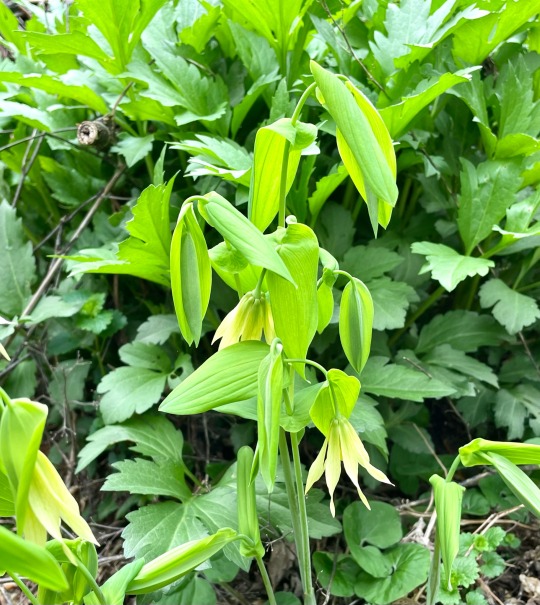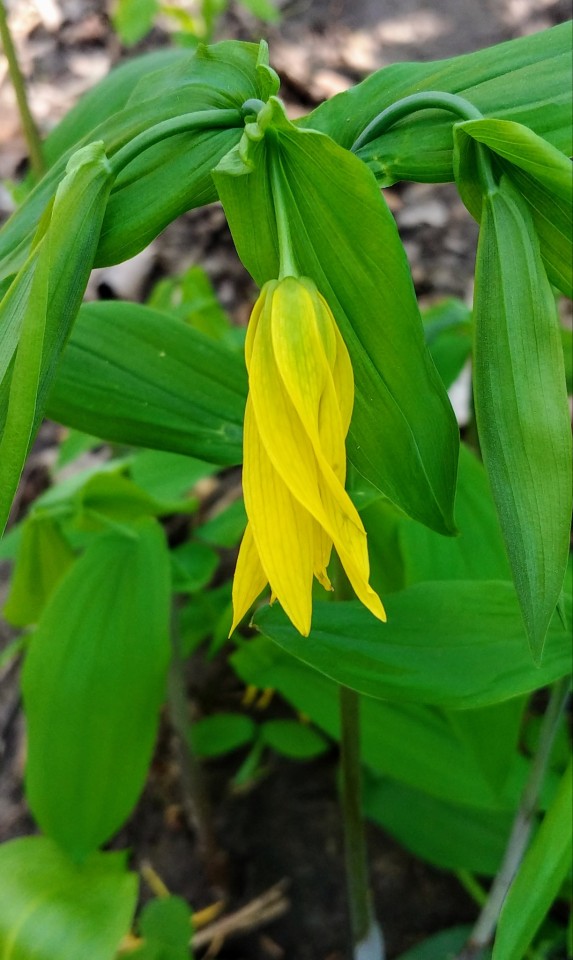#uvularia grandiflora
Explore tagged Tumblr posts
Text


Merrybells, also known as large bellwort, Uvularia grandiflora, in the garden right now. It’s native to the eastern US but I’ve only seen other species of this genus in the wild here.
The leaves behind it are a cut leaf coneflower, Rudbeckia laciniata.
#plants#native plants#gardeners on tumblr#garden#april#uvularia#uvularia grandiflora#merrybells#springtime#plantblr
225 notes
·
View notes
Text


Largeflower Bellwort
Uvularia grandiflora
Also known as Merrybells, this stunning spring ephemeral in the lily family is found in woods throughout central and eastern North America. Native Americans traditionally used this species as a remedy for certain skin conditions.
April 12th, 2023
St. Louis County, Missouri, USA
Olivia R. Myers
@oliviarosaline
#botany#Uvularia grandiflora#uvularia#Colchicaceae#bellwort#bellworts#largeflower bellwort#liliales#monocots#the ozarks#ozarks#nature#woods#forest floor#forest#plants#native plants#native flowers#spring#spring ephemerals#fairycore#fairy core#naturecore#forestcore#yellow flowers#Missouri#Missouri nature#hiking#exploring the woods#wildflowers
26 notes
·
View notes
Text

think of pavlov and worry when i see this,
call it a bellwort
(my photo, may 2024)
#original photography on tumblr#flowercore#botany#north american flora#Uvularia grandiflora#large-flowered bellwort#i hope ur happy#dumbass puns
2 notes
·
View notes
Text

Ohio Spring Wildflower Field Guide
#large-flowered bellwort#uvularia grandiflora#merrybells#flower#flowers#spring flowers#spring#floral#wildflowers#wild flowers#ohio#ohio wild flowers#botany#april#may
4 notes
·
View notes
Text
Exploring The Beauty And Charm Of Uvularia Grandiflora: A Native Delight For Your Garden
Uvularia grandiflora, also known as Large-flowered Bellwort, is a captivating native plant that brings beauty and charm to gardens across the country. With its graceful, drooping yellow flowers and slender stems, Uvularia grandiflora is a sight to behold. In this article, we will delve into the enchanting world of Uvularia grandiflora, exploring its characteristics, cultivation tips, and the joy it can bring to your garden.
Characteristics of Uvularia grandiflora: Uvularia grandiflora is a perennial plant that belongs to the lily family. It is characterized by its graceful growth habit, reaching a height of about 1 to 2 feet (30 to 60 cm). The plant features long, arching stems with pairs of elliptical leaves along their length. In mid to late spring, Uvularia grandiflora produces pendulous, bell-shaped flowers that hang delicately from the stems. These flowers showcase a vibrant yellow color, adding a touch of sunshine to any garden landscape.

Cultivation Tips for Uvularia grandiflora: Uvularia grandiflora thrives in shady to partially shaded areas, making it an excellent choice for woodland gardens or areas with dappled sunlight. When selecting a location for planting, ensure that the soil is well-drained and rich in organic matter. This plant prefers moist soil conditions but can tolerate periods of dryness once established.
To cultivate Uvularia grandiflora, start by preparing the soil by loosening it and removing any weeds or debris. Plant the rhizomes at a depth of about 2 to 4 inches (5 to 10 cm), spacing them approximately 12 to 18 inches (30 to 45 cm) apart. Water the newly planted rhizomes thoroughly and continue to provide regular watering during dry spells.
Uvularia grandiflora is relatively low-maintenance, requiring minimal pruning or fertilization. However, it benefits from a layer of organic mulch around the base of the plant to conserve moisture and suppress weed growth. This mulch also helps maintain a cool root environment, which is ideal for Uvularia grandiflora's growth.
The Joy of Uvularia grandiflora in Your Garden: Adding Uvularia grandiflora to your garden landscape offers numerous benefits. Its elegant appearance and vibrant flowers create a focal point that enhances the overall aesthetics of the garden. The plant's drooping flowers add a sense of movement and grace, creating a tranquil atmosphere. Uvularia grandiflora also attracts pollinators like bees and butterflies, contributing to the biodiversity and ecological balance of your garden.
Furthermore, Uvularia grandiflora's status as a native plant makes it an essential addition to support local ecosystems. By incorporating native plants like Uvularia grandiflora, you contribute to the preservation of regional biodiversity and provide food and habitat for native wildlife.
In conclusion, Uvularia grandiflora, or Large-flowered Bellwort, is a captivating native plant that adds beauty and charm to gardens. Its graceful growth habit, vibrant yellow flowers, and low-maintenance nature make it a desirable choice for garden enthusiasts. Embrace the allure of Uvularia grandiflora in your garden and create a haven of natural beauty that will delight you and contribute to the ecosystem.
1 note
·
View note
Text


Uvularia grandiflora at Barking Slopes Conservation Area in New Kensington, PA
Also called Largeflower Bellwort
26 notes
·
View notes
Text
My Garden Flowers Part 8
All photos mine.


















In order of appearance:
211. White Avens (Geum canadense) This was here before I got there and as she's native she survived the purge I did of the weeds.
212. Orange Coneflower (Rudbeckia fulgida) I didn't plant this, but she's in lots of places now and she's not always this orange, often leaning more toward amber, but she is always very pretty.
213. Tall White Lettuce (Prenanthes altissima) Not pictured as she hasn't flowered yet.
214. American Red Raspberry (Rubus strigosus) Not pictured as she hasn't flowered yet.
215. Canada mayflower (Maianthemum canadense) Not pictured as she hasn't flowered yet.
216. Barren Strawberry (Waldsteinia fragarioides) The leaves look a lot like strawberry leaves, the flowers look like if strawberry flowers were yellow, and they make a red berry! But it tastes woody and bland. Hence the name. I still want to make a jam of them if I ever get enough of them, though.
217. Tufted Hairgrass (Deschampsia ceaspitosa) Don't mind the bull thistle behind it that I wasn't able to remove, but the foliage of the grass is a nice blue-green and the flowers are, well, tufts.
218. Largeflower Bellwort (Uvularia grandiflora) The flowers are always bowed as if wilting. They're springtime flowers only.
219. Spotted Jewelweed (Impatiens capensis) One of the only two Impatiens species native this far north. The flowers of this one are orange. She likes moist to wet spots and can handle full sun to full shade.
220. Fringed Loosestrife (Lysimachia ciliata) Yellow flowers in summer, dark red leaves in autumn.
221. Thicket Creeper (Parthenocissus vitacea) Not pictured as she hasn't flowered yet.
222. Skunk Cabbage (Symplocarpus foetidus) Not pictured as she hasn't flowered yet.
223. Black Cherry (Prunus nigra) Not pictured as I haven't got pictures yet.
224. Woodland Sunflower (Helianthus divaricata) A sunflower that can handle shade! Not heavy shade, but a considerable amount.
225. Fringed Willowherb (Epilobium ciliatum) I didn't plant this, but she has cute tiny flowers and she has tasty leaves.
226. Starry False Solomon's Seal (Maianthemum stellatum) Little star-shaped white flowers become candy-striped red berries.
227. Narrow-Leaved Wild Leek (Allium burdickii) Like her close cousin, A. tricoccum, she only matures enough to flower after seven years, so this is special.
228. Mayapple (Podophyllum peltatum) Not pictured as she hasn't flowered yet.
229. Common Selfheal (Prunella vulgaris vulgaris) A common garden weed but she's native to my range of acceptability for my garden, so she stays wherever she's not in the way.
230. Bog Bean (Menyanthes trifoliata) Not pictured as she hasn't flowered yet.
231. Red Wakerobin (Trillium erectum) Her stem broke the first year I had her. I was afraid she'd die but I was able to splint her and she survived to flower again the following year for this picture!
232. Marsh Violet (Viola palustris) Small round leaves grow close to the ground and flowers come up on stalks a few inches above. As the name suggests she prefers things wet.
233. Duck Potato (Saggittaria latifolia) Not pictured as she hasn't flowered yet.
234. Purple avens (Geum rivale) Not pictured as she hasn't flowered yet.
235. Maypop (Passiflora incarnata) I got two cultivars and they sadly didn't survive the winter. Maybe the wild type would fare better if I could get my hands on that.
236. American Bur-Reed (Sparganium americanum) Fluffy ball flowers. She likes things moist to wet.
237. Heart-Leaved Alexanders (Zizia aptera) She's not quite as showy as her cousin, Zizia aurea, but a nice little plant in a moist to wet area.
238. Canada Burnet (Sanguisorba canadensis) Not pictured as she hasn't flowered yet.
239. Oval-Leaved Milkweed (Asclepias ovalifolia) Her second flowering year. She's considerably shorter than most milkweeds. Her cream-coloured flowers are a lovely addition to a garden. Especially if you're tempted to get the white cultivar of swamp milkweed, oval-leaf milkweed also likes wet areas and is well-behaved. Why not get her instead?
240. Redbud (Cercis canadensis) Not pictured as I haven't got pictures yet.
#blackswallowtailbutterfly#my photos#photography#my garden#garden flowers#native plant gardening#native flowers of Carolinian Canada and USA
12 notes
·
View notes
Text

Large-flowered bellwort (Uvularia grandiflora)
Patreon | YouTube | Twitter | Shop
36 notes
·
View notes
Text


Uvularia grandiflora is a fun spring flower we get in eastern North America. Although often called large-flowered bellwort, my favorite name for them is merrybells! They do have a merry look to them.
Although historically used by some Indigenous groups as medicine, merrybells are only really used as ornamental plants today.
73 notes
·
View notes
Photo

Largeflower bellwort (Uvularia grandiflora), at Wehr Nature Center at Whitnall Park, Milwaukee, Wisconsin.
#photographers on tumblr#largeflower bellwort#Uvularia grandiflora#Wehr Nature Center#Whitnall Park#Millwaukee County#Milwaukee#Wisconsin
47 notes
·
View notes
Text

Large-flowered bellwort blooming in the garden.
61 notes
·
View notes
Photo




In early May the woodland garden was getting buffeted with a nasty strong and cold East wind but the native plants were fighting to bloom anyways.
#my post#plantblr#gardeners of tumblr#gardeners on tumblr#woodland garden#my gardens#my plants#Trillium#Trillium grandiflorum#Viola pubescens#Uvularia grandiflora#bellwort#merrybells#dutchman's breeches#Dicentra cucullaria#Dicentra
19 notes
·
View notes
Photo


Uvularia grandiflora, although it’s not obvious from appearance this species is generally much larger all around then the other species in Ohio. Noted mostly for how large the flowers are and the perfoliate leaves as an identifier it is still confused with the sessile bellwort when first emerging. For these characteristics it is known commonly as the large flowering perfoliate bellwort. I found this species in quite the high abundance at Clifton Gorge while I was there and it made for quite the picturesque scene. Much like the fume wort members of the poppy family this species is also ant reliant for seed dispersal. This is a very important mechanic for many spring species and I am hoping to discuss more about it in more detail a few posts from now.
#Uvularia grandiflora#ohio#botany#spring#wildflowers#plants#plantblr#ecology#flower#flowers#nature photography#nature#photography#my photography#photographers on tumblr
10 notes
·
View notes
Video
n99_w1150 by Biodiversity Heritage Library Via Flickr: Canadian wild flowers Montréal :J. Lovell,1868. biodiversitylibrary.org/page/58013787
#Botany#Canada#Pictorial works#Wild flowers#Canadian Museum of Nature Library / Bibliothèque du Musée canadien de la nature#bhl:page=58013787#dc:identifier=https://biodiversitylibrary.org/page/58013787#artist:viaf=105885420#Agnes Dunbar Moodie Fitzgibbon#agnes dunbar moodie fitzgibbon chamberlin#wood anemone#large flowered bellwort#spring beauty#spring-beauty#Sharp lobed Hepatica#anemone nemorosa#uvularia grandiflora#merrybells#hepatica acutiloba#claytonia virginica#Virginia spring beauty#eastern spring beauty#grass-flower#fairy spud#botanical illustration#scientific illustration
0 notes
Photo

Uvularia grandiflora
Please check out our website here: http://lakesideendeavors.com/growwild/ Want wildflower seeds? Check out our Ebay: https://www.ebay.com/sch/lakesideseeds/m.html?_nkw=&_armrs=1&_ipg=&_from=
#Uvularia grandiflora#wildflower#wild flowers#wildflowers#wild flower#flower#flowers#plant#plants#garden#gardening#gardens#nature#nature photography#photography#growwild#growild
36 notes
·
View notes
Photo

Large-flowered Bellwort (Uvularia grandiflora)
Blue Mound State Park, WI, 4-23-17
22 notes
·
View notes